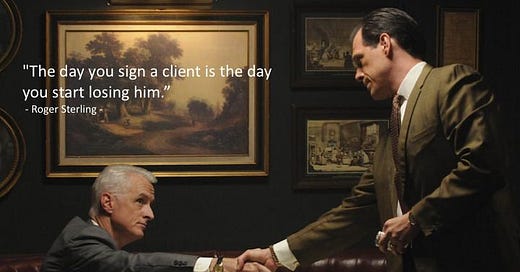The end is the beginning
Even when you're enjoying being out, you're thinking about what time you need to start getting back
For most situations in life, there's a Seinfeld sketch analogy. I've lost count of the times I've said, "This reminds me of that episode of Seinfeld where...". One of the most memorable skits comes from the very first episode, from Jerry's opening clip of stand-up. He talks about the fact that even while you're enjoying being "out", you're already thinking about going home.
It's one of those "it me" observations that comedians are so skilled at identifying and that we can only dream of in our strategic and creative work.
It cropped up for me this week as I end my second month of gardening leave. One of the many joys of not working is spending much more time every day with my daughter. Doing more with her, whether it's soft play, the park, or Friday music class, feels like a blessing. But I'm already thinking, "What do we do when it ends in April?" At what point do I need to start seeding the idea that Daddy will be back at work all day soon with her toddler mind? It's going to be a tough transition for all of us.
But this notion of loss, of giving things up, of times you enjoy coming to an end, is one of the core tenets of our humanity. Maria Popova discusses that in The Marginalian this week, via her reading of Judith Viorst's book Necessary Losses.
Popova highlights some of the most pertinent passages, picking out the fact that "losses are a part of life — universal, unavoidable, inevitable. And these losses are necessary because we grow by losing and leaving and letting go." It is sad when your blissful two-week holiday is over, your favourite band plays their last song and the house lights come up, or your gardening leave ends, and you have to go back to work.
But the lack of an ending would inevitably lessen the experience. I know I need to make the most of my time with Ivy over the next four months because it will end. And I also know that ultimately, this loss of time together will be beneficial for both of us - a big part of parenting is helping your child become so independent they end up not needing you (sob).
And, much as I love the idea of retiring at 43, I feel I've still got plenty in the tank to help my new agency and future clients deliver kickass campaigns. We'll both benefit from our additional space.
As Judith Viorst puts it, "We cannot become separate people, responsible people, connected people, reflective people without some losing and leaving and letting go."
Those feelings of losing, leaving and letting go can be challenging, unsettling and downright strange. It feels weird and unnerving to leave Teneo and all my intelligent, gifted colleagues of eight years. Losing a client is often a painful experience and one that takes time to get over. Even if this ending is inevitable, as Roger Sterling says in Mad Men: "The day you sign a client is the day you start losing him" (all the clients were men in the highly sexist world of Mad Men).
Big campaigns coming to a close can also create this same slight feeling of emptiness, a sense of "what the hell am I going to do now, without that thing that has dominated my thoughts for so long?" But those feelings pass; new clients and campaigns come across your desk, and you can apply everything you learned and experienced in new contexts.
And, of course, you can also start mentally preparing for those new clients when those clients' projects come to an end. Because, as Jerry Seinfeld says: "Wherever you are in life, it's my feeling - you gotta go". You've got to be ready for the next thing, wherever or however it comes along.



